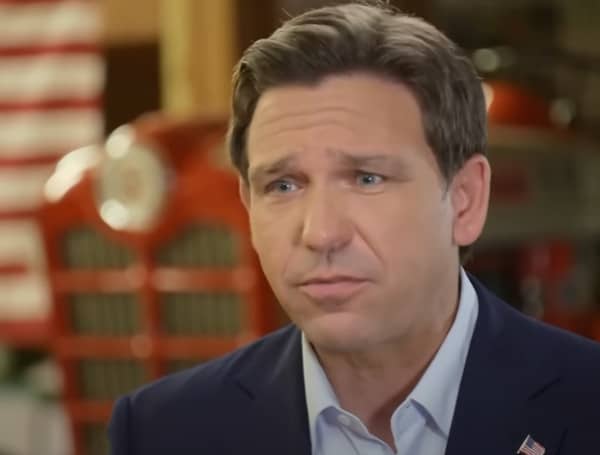Sidestepping what could have been a major ruling about the state’s public-records laws, an appeals court on Wednesday upheld a judge’s decision that shielded Gov. Ron DeSantis’ administration from releasing records.
The appeal stemmed from a public-records request, filed by a person identified in court documents as J. Doe, seeking information from DeSantis’ office about influential conservatives involved in discussions about appointing Florida Supreme Court justices.
In a subsequent lawsuit, Leon County Circuit Judge Angela Dempsey rejected the public-records request on a series of grounds, including that the governor had “executive privilege” that could be used to prevent release of certain documents.
Read: Florida Gov. DeSantis Signs $116.5 Billion “Focus On Florida’s Future” Budget
Wednesday’s ruling by a three-judge panel of the 1st District Court of Appeal upheld the denial of the public-records request but did not weigh in on the issue of executive privilege.
“After denying the petition for procedural reasons, the court (Dempsey) unnecessarily considered the merits of the petition and ruled the identities of the legal conservative heavyweights are protected by executive privilege,” said the ruling, written by Judge Clay Roberts and joined by Judges Stephanie Ray and Susan Kelsey. “We expressly decline to rule on the propriety of this ruling as it was irrelevant and unnecessary.”
The records request was rooted in an Aug. 25, 2022, interview in which DeSantis told conservative commentator Hugh Hewitt that a group of “six or seven pretty big legal conservative heavyweights” had helped him screen candidates for appointment to the Florida Supreme Court.
In the request, Doe sought “any and all materials” between or among DeSantis, First Lady Casey DeSantis, the governor’s chief of staff, his lawyers and a range of other aides pertaining to the “legal heavyweights.”
During arguments in the case last month, Phil Padovano, a lawyer for Doe, argued that his client should be allowed to file the lawsuit anonymously because the state Constitution allows people to make public-records requests without using their names.
Read: Sen. Marco Rubio Blasts Biden Admin’s Foreign Policy After Russia Brushes Florida Coast
But the ruling Wednesday said Doe did not adequately justify maintaining anonymity in the lawsuit.
“Florida recognizes a strong presumption of openness for all court proceedings,” Roberts wrote. “While anonymous filings are not prohibited in Florida, they should be reserved for those exceptional circumstances that outweigh the public interest in open proceedings.”
The panel also found that Doe’s request, which the ruling said sought “records between many people during an unspecified period of time,” was too broad.
“While the records custodian could possibly intuit some contextual parameters, the core information appellant (Doe) sought was a list of names Governor DeSantis referenced in a particular interview. Fulfilling such a request would require the records custodian to consult with the governor to determine exactly who he was referencing in this interview. This is akin to an interrogatory seeking information, not a request to produce public records,” Roberts wrote.
The court’s “inquiry could be different” if Doe had “drafted his request in a more tailored or specific manner,” the ruling said, adding that Doe’s request “could not be fulfilled as submitted.”
Lawyers for Doe and the state have wrangled about whether the use of executive privilege conflicts with a 1992 constitutional amendment aimed at providing access to public records.
Read: Russian Naval Flotilla Sails Within 30 Miles Of Florida Coast, Prompts U.S. Response
“The confidentiality of consultations with advisors — precisely the information Doe demands here — is critical to the execution of the governor’s constitutional duty to fill judicial vacancies, and Doe has not identified any need for this information that would overcome the governor’s presumptive privilege to maintain that confidentiality,” a brief filed by lawyers for DeSantis and Attorney General Ashley Moody said.
The state’s lawyers also argued that executive privilege was not “overridden” by the 1992 public-records amendment.
“Maintaining the confidentiality of deliberations concerning judicial appointments is necessary to enable the governor and his aides to receive candid, unfiltered advice regarding the exercise of an important constitutional function,” the brief said.
Dempsey wrote, in part, that the “purpose underlying the executive privilege supports its recognition here.”
The circuit judge’s ruling drew the attention of state and national media organizations and open-government advocacy groups, who filed friend-of-the-court briefs arguing that such use of executive privilege would undermine Florida’s broad public-records laws.
Read: Florida Gov. DeSantis Slams Judge Rejecting Block On Trans Treatments For Kids “It’s Wrong”
One brief filed by a coalition that includes groups such as the League of Women Voters and the Florida Center for Government Accountability said Dempsey’s ruling “upends decades of jurisprudence interpreting” the laws.
Speaking to reporters after last month’s arguments, Padovano said that the blanket exemption sought by DeSantis “opens the door, really, to what I would think is the destruction of the right to view executive branch government records, because they’re always going to go, ‘That’s you know, that’s my my record.’”
Padovano, a former appellate judge, said he hoped the panel would make a definitive ruling on the issue of executive privilege.
“I’d like them to put it to rest permanently. I think the one fear I have is that the court might want to, in order to avoid the question, dismiss the case on some other ground. But I don’t think it would take a great deal of courage to say that there is no such thing as executive privilege in the context of public records,” he said after the hearing. “It’s never been the case in Florida. We’ve been a state since 1845. No one has ever said that.”
Help support the Tampa Free Press by making any small donation by clicking here.
Android Users, Click To Download The Tampa Free Press App And Never Miss A Story. Follow Us On Facebook and Twitter. Sign up for our free newsletter.



